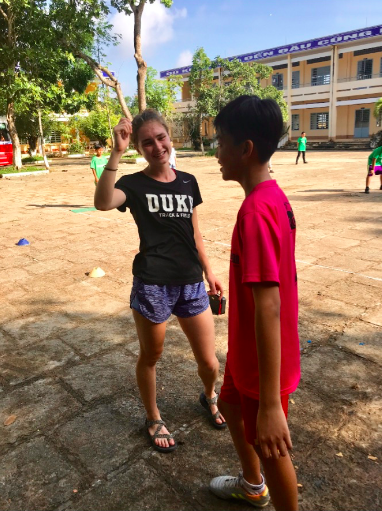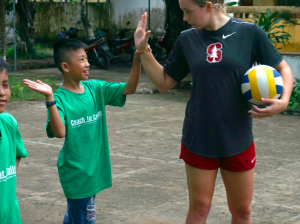
I thought I knew a lot about relationships before traveling to Vietnam. All sorts of relationships, too: friendships, dating relationships, familial relationships, strained relationships, you name it. I’ve had my fair share of mishaps and miscommunications, so I thought I had mostly figured out how to navigate the very confusing human psyche. I can read body language, pick up on subtle social cues, know how to diffuse situations, understand how to listen attentively, and can generally tell how someone is feeling.
Well, upon arriving in Long My, Vietnam, one could say I was “schooled” (pun intended, since we rolled up to a primary school each day in a large red bus). All of a sudden, without the English language, my skills seemed to be gone. In English, I could listen for slight intonations, the ups and downs of someone’s tone that gave me clues about how to respond. Vietnamese is a language that relies heavily on tones, with a seemingly endless amount of symbols and accents that I had no idea how to pronounce. This meant the ups and downs I usually listened for in English no longer meant the same thing – now it was just the normal lilting of the language.
There is no doubt that this experience was extremely humbling. I expected that. After all, I was traveling halfway around the world to a culture I knew next-to-nothing about. If I wasn’t confused and humbled at some point I would be worried. What I didn’t expect is who would became my teachers.
The kids! Classic. People half my age and sometimes half my size (which is saying something since I am about 5’3”) became my instructors. As I struggled to figure out how to communicate with them, they had no problem. Three of my closest friends there had three different ways of communication. (Their names have been changed to protect their privacy.)
******
Lang, 7th Grade, Green Team
Chosen Form of Communication: Vietnamese
About halfway through the second week of camp, a particularly energetic student on the Green Team started randomly attacking me with hugs. He stood out to me during soccer practice as he alternated between drawing in the sand (he was actually quite good and often drew complex anime) and furiously chasing after the ball.
At the beginning of the day when we got off the bus, he would run up, grab my wrist, and wrap me tight in a hug, doing the same at the beginning of soccer practice and biology (the sport and class I helped teach). By the third week, after a hug he would tug me by the hand and motion for me to sit down next to him. He pointed to his nose. Confused, I said, “Nose.” He nodded and then said, “cái mũi” (pronounced cay moy). I repeated after him, butchering the pronunciation several times as he laughed and patiently repeated it until I got it. He gave me a thumbs up and then ran off to his classroom.

The next day the same thing happened. At the beginning of biology, he sat me down at the front of the classroom and pointed to his nose. “Cái mũi,” I said proudly. He beamed, then pointed to his eye. “Cầu mắt,” he said. Once again, I tried and failed, but now the whole class was at the front of the classroom. He repeated it again. I tried again. He beamed and nodded vigorously, indicating I had pronounced it correctly. The class burst into such a celebratory ruckus it was like I had just announced they had all won the lottery. For the first ten minutes of class, they pointed to different body parts and items in the classroom, saying the Vietnamese word and waiting for me to say it back, congratulating me with a cheer, a high-five, or a thumbs up every time I managed to say it correctly.
My Vietnamese co-teachers had to reign me in and tell me it was time to begin the lesson. I would have kept doing it all class, mostly because I had never felt so connected to the kids. I could finally communicate one-on-one with them in this way, no translation necessary.
Max, 6th Grade, Pink Team
Chosen Form of Communication: English
Wickedly smart and extremely coordinated, Max was a force to be reckoned with both on the sports field and in the classroom.
I knew he was incredibly smart, but I wasn’t aware of just how much English he knew until the last half of camp. The first week and a half, he would call me by name – “Chi Mac” – and initiate high-fives, which I loved. Then, on the 4th of July, without any prompting, he came up to me and spoke a sentence entirely in English.
“Chi Mac, Happy 4th of July!” Stunned, I looked at him and said, “Thanks, Minh!” before he scampered off to the first sports session. And so began our quest to communicate.
First the topic was soccer. He said something to me, but I couldn’t understand it. So he became an actor: He pretended to kick his friend in the shin and then blew an imaginary whistle, holding up an invisible piece of paper in his hand and yelling the word he was trying to say. It took me a couple seconds, but then it clicked. “Oh, RED CARD!” I practically yelled. “YES!” he yelled back. It was just two words, but it felt like a huge breakthrough. The next day the same spectacle occurred for me in order to figure out he was saying “free kick.”

Every moment we understood each other was a victory. On the last competition day, he kept it coming with elaborate charades. First he came up to me with a blank piece of paper, motioned to it and said “Menu.” I nodded in understanding. He pointed to the left side of the piece of paper, slowly listing off foods. “Chicken, shrimp, fish, pork,” and then the right side of the menu, “Water, Soda, Orange Juice.” I ordered chicken with orange juice (an adventurous combination for sure), and he gave me a high-five and ran off to mess around with his friends. A few hours later he came up to me again, a mischievous glint in his eye. This time he pointed to himself. “I am doctor.” I grinned. “You are sick,” he continued. “I am?” I kidded him. He nodded. “I have a stomachache,” I said.
“Stomachache,” he repeated, muttering to himself and looking at the ground. I poked him in the stomach. “Stomachache,” I repeated making a frowny face. “Stomachache!” he repeated, this time understanding. He laughed and pretended to use a stethoscope to listen to my heart. “Hmmmm,” he said, pressing his ear as if listening intently to my heartbeat through the imaginary wire. “You are good!” he said, then high-fived me and ran off again. It seems I had made a miraculous recovery. I understood the doctor, no translation necessary.
Gabe, 7th Grade, Pink Team
Chosen Form of Communication: Games and Gestures
Giang was a sweetheart – there is no other way to describe him. When we took photos of the kids on the first day of school, he was the only one in the 7th grade class that smiled. He wanted to be a professional soccer player when he grew up, and his skill was evident during soccer practice. He danced around the other kids with the ball.

He didn’t know any English, but it didn’t seem to matter. He was the first kid in the 7th grade to give me a hug at the end of the day instead of just a high-five. By the end of the first week, he loved gifting me with small balloons he would blow up. His favorite game was tapping me on the opposite shoulder, causing me to look the opposite direction, see no one and then whip around and lightly punch him on the arm because he had fooled me again. When we lined the kids up into two lines to listen to instructions on competition day, I would come and sit next to the kids, usually next to him. By the last competition day, I would come and sit down and he would lean against my knees, using them like the back of a chair. Then he would tilt his head back so that he would looking at me upside down, and give me the biggest smile I had ever seen. I could see the joy in his eyes and I hoped he could see it in mine, no translation necessary.
******
Despite the language barrier, each student worked so hard at communication and we found ways to connect deeply in other ways.
That made saying goodbye to these kids one of the hardest things I have ever done. I should have expected that. But I still wasn’t prepared.
Lang taught me how to say goodbye in Vietnamese through tears (“Tạm biệt”) and gave me the world’s tightest hug. Max was one of the only kids in camp not crying on the morning we left, and I soon found out why. He came up to me, gave me a high-five and said, “See you in America.” I grinned. I didn’t doubt it. Gabe was the goodbye that finally made me cry. He was wearing a striped button-down shirt and covered his eyes as he approached me, because he was already crying. I gave him a hug and he mumbled, “Chi Mac,” and produced a blue and white teddy bear from his bag for me. A tear slipped down my cheek as I knelt down and took it from him, then stood up and gave him a bear hug that I hoped communicated how much I cared about him. He wrapped his arms all the way around me and sobbed into my shirt. Neither he nor I could stop crying, so we just stood there. Eventually the coaches had to get on the bus, so I gave him one final squeeze said thank you. He peeked through his fingers as I waved goodbye from the bus.
This is what my three friends taught me in Vietnam: human connection – the type that connects souls – doesn’t require a common language, or really any language at all. All you really need is a willingness to learn, a high-five, and a smile. No translation necessary.
Note: None of this is to downplay the role the Vietnamese co-coaches and co-teachers played in communicating with the kids. They were astounding in their ability to do a million things at once: manage the kids, teach, and translate everything for us mono-lingual Americans. Thank you to Nelly, Johnny, Hao, Annie, Thu, Fiona, Van, and Rose.
